I found turning Shi'ite much easier while playing Tunesia. Just send your men to ship and have them wait outside Tunis Harbor and let the Mameluks capture all your lands, they take Triplotainia usualy, and covert you, and give you a nice little CB on the other Maghreb nations.
Carthage Reborn - the first Tunisian AAR
- Thread starter Farquharson
- Start date
-
We have updated our Community Code of Conduct. Please read through the new rules for the forum that are an integral part of Paradox Interactive’s User Agreement.
You are using an out of date browser. It may not display this or other websites correctly.
You should upgrade or use an alternative browser.
You should upgrade or use an alternative browser.
Another Classic AAR from Farquarson 
Are you Arab or Berber? If you're Arab, you really ought to try and get all those Egyptian and Syrian provinces before they turn Shi'ite. If you're Berber, then your best provinces are ... <realises where the train of thought's going> ... cores for a big, rich, high-manpower Latin-tech nation with nothing better to do than drive you into the sea ... maybe whittling down Algiers is a better bet!
I see France has got Provence, Genoa has got Milan and ... WHO has got Dalmatia? It looks like either Dulkudir or Denmark .. ?!
And how are the Ottomans doing? I think they get cores on you eventually.
Best of luck
Are you Arab or Berber? If you're Arab, you really ought to try and get all those Egyptian and Syrian provinces before they turn Shi'ite. If you're Berber, then your best provinces are ... <realises where the train of thought's going> ... cores for a big, rich, high-manpower Latin-tech nation with nothing better to do than drive you into the sea ... maybe whittling down Algiers is a better bet!
I see France has got Provence, Genoa has got Milan and ... WHO has got Dalmatia? It looks like either Dulkudir or Denmark .. ?!
And how are the Ottomans doing? I think they get cores on you eventually.
Best of luck
Hey! Keep these comments flowing - I love it!
Well Semi-Lobster, maybe not that one - I read it just before I ate my dinner...
Right away, juszuf7, right away!
Interesting strategy, LordLeto. It may be a bit late for me though. My vague plan at the moment is to grab as much of the Mameluks as I can, then diplo-annex the other bits of the Maghreb. As you'll see from the update below, I now have a helpful ally for dealing with the Mameluks
I'm Arab, merrick, so yes, all those (for the moment) sunni arabic provinces are tempting me And btw Dalmatia is still just part of Ragusa. Sorry to be so boring! As for the Ottomans, news coming soon...
And btw Dalmatia is still just part of Ragusa. Sorry to be so boring! As for the Ottomans, news coming soon...
Episode 4: That was Fun, Let’s do it Again!
Having proved that it was possible for the Hafsid Army to capture an enemy province, Uthman was now under pressure to start empire-building in earnest. The fact that he still had very little money and could not support an army larger than 11,000 men for any length of time were considered mere details.
With no navy at all, Uthman’s options for expansion were fairly straightforward: he could go east or west. East lay the nasty shi’ite Mameluks and their Hedjaz allies, easy to declare war on, but not necessarily easy to defeat in a long war. To the west lay Algiers, conveniently situated between Tunisia and Fez, like an almond between the jaws of a nutcracker. But if Uthman attacked Algiers, it was almost inevitable that the Mameluks would lose no time in making a trip into Tripoli, and not just for sightseeing.
Sultan Uthman to Minya his Chief Military Advisor: I have decided that we need to capture another Algerian province.
Minya: Excellent, Your Highness! I will give the order for the army to assemble in Kabylia.
Uthman: Not in Kabylia - in Tripolitania!
Minya: Er - perhaps if I might be so bold as to point out to Your Majesty that - er... Algiers is THAT way... * He points west *
Uthman: Ah, but I have a fiendishly clever plan! We attack those nasty Mameluks, make peace as quickly as possible, then we have a five year truce with them, during which they will certainly leave us in peace to ravage Algiers!
Minya: Your audacity is astounding, Sire. Just one thing - what if the nasty Mameluks refuse to make peace unless we hand over Tripoli?
Uthman: Ha, ha, ha! I thought you would ask that. The answer is simple! You will be put in command of the army - if you lose Tripoli to the Mameluk dogs, you will be beheaded!
Minya: Er... splendid, Your Excellency. Truly your kindness is legendary...
Uthman declared war on the nasty Mameluks in September 1460, and the Hafsid Army quickly marched on Benghazi and besieged it. In June 1461 the peasants in Kabylia revolted, bringing an unexpected twist to Uthman’s plan. Then a large Mameluk army arrived to relieve Benghazi, in which they were successful, though only just. Ahmad II Sultan of Algiers, seeing that Uthman was sinking into deep trouble, chose this moment to declare war on Tunisia, which at least had the merit of saving Uthman a hefty drop in stability by declaring war himself.
The Hafsid Army was reinforced, for which Uthman was obliged to take another large loan, and sent to deal first with the Kabyle insurgency. They arrived to find that the insurgency had meanwhile turned into an Algerian invasion, and they were driven back to Tunis. A second attempt was more successful, and the Algerians were routed. This done, the army was reinforced some more, then sent on to Constantine. Miraculously (for Minya), the nasty Mameluks stayed put in Benghazi. On the other hand, a huge Fezzi army also seemed to have been stricken with paralysis a few days' march away from Orania.
In February 1463 the Mameluks agreed to a White Peace, and Minya, rubbing his neck in a relieved fashion, arrived at the gates of Constantine soon after and laid siege to the city. Then the Fezzi army suddenly came to life and invaded Orania, and at last things began to look up for Uthman. Constantine fell in March 1464, about the same time as Oran fell to the Fezzis. The Hafsid Army went on to besiege Algiers, while the Fezzis went home...
Algiers surrendered in October and was duly sacked and the exuberant Hafsid Army set off for Biskra, capital of the last remaining Algerian province. Unfortunately, halfway there they met a large army of very angry Algerians, who all but wiped them out. Uthman decided it was time to make peace, and in July 1465 Ahmad II sensibly agreed to hand over the province of Aures, so that everyone could go home happy. The Fezzis, of course, had already done so.

The lush countryside of Aures Province
Thus the Tunisian Empire (as people were tentatively beginning to call it) was enlarged to include 1700 mountain dwelling Berbers and a few iron mines. It was one more small step towards the fulfilment of Abdulaziz’s glorious dream. And as Uthman remarked somewhat optimistically, if Tunisia ever came into some money, it would make a great place for a weapons manufactory. Meanwhile, it took him a mere six years this time to pay off his war debts.
It was at this point that luck chose to shine on Sultan Uthman. First of all, just as he was about to part with some hard-earned cash in order to reinforce his now paltry army, 5,000 Berber cavalry suddenly appeared out of nowhere, eager to serve in the Hafsid Army. Then, in 1472, the Ottoman Sultan Mehmet II Fatih, with whom Uthman by now enjoyed excellent relations, since they shared so many common interests, such as wiping the Mameluks from the face of the earth, dishonoured his alliance with the mysterious Kaliphate and the even more mysterious Timurid Empire. On the off chance, Uthman invited Mehmet to his alliance with Fez, and to his astonishment, Mehmet accepted.

Sultan Mehmet II Fatih
Sultan Mehmet also had other interests, such as wiping Albania from the face of the earth, and in September 1473, Uthman happily joined him in a war against Albania, Bosnia, Ragusa, Venice and Poland. Needless to say, the Hafsid Army’s participation in this war was minimal, but when the Ottoman Empire forced Albania to its knees in 1476, Uthman received a hefty share of the Albanian state treasury, which was emptied as part of the peace deal. Along with the proceeds from the formation of a monopoly company the same year, Tunisia suddenly found itself comparatively rich. It wasn’t quite enough for a weapons manufactory, but it was surely enough for another war...
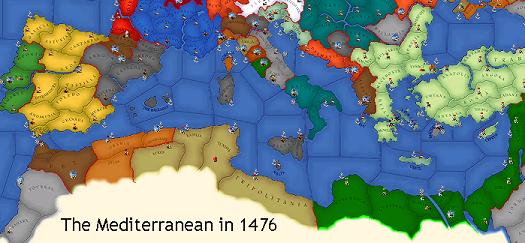
Well Semi-Lobster, maybe not that one - I read it just before I ate my dinner...
Right away, juszuf7, right away!
Interesting strategy, LordLeto. It may be a bit late for me though. My vague plan at the moment is to grab as much of the Mameluks as I can, then diplo-annex the other bits of the Maghreb. As you'll see from the update below, I now have a helpful ally for dealing with the Mameluks
I'm Arab, merrick, so yes, all those (for the moment) sunni arabic provinces are tempting me
Episode 4: That was Fun, Let’s do it Again!
Having proved that it was possible for the Hafsid Army to capture an enemy province, Uthman was now under pressure to start empire-building in earnest. The fact that he still had very little money and could not support an army larger than 11,000 men for any length of time were considered mere details.
With no navy at all, Uthman’s options for expansion were fairly straightforward: he could go east or west. East lay the nasty shi’ite Mameluks and their Hedjaz allies, easy to declare war on, but not necessarily easy to defeat in a long war. To the west lay Algiers, conveniently situated between Tunisia and Fez, like an almond between the jaws of a nutcracker. But if Uthman attacked Algiers, it was almost inevitable that the Mameluks would lose no time in making a trip into Tripoli, and not just for sightseeing.
Sultan Uthman to Minya his Chief Military Advisor: I have decided that we need to capture another Algerian province.
Minya: Excellent, Your Highness! I will give the order for the army to assemble in Kabylia.
Uthman: Not in Kabylia - in Tripolitania!
Minya: Er - perhaps if I might be so bold as to point out to Your Majesty that - er... Algiers is THAT way... * He points west *
Uthman: Ah, but I have a fiendishly clever plan! We attack those nasty Mameluks, make peace as quickly as possible, then we have a five year truce with them, during which they will certainly leave us in peace to ravage Algiers!
Minya: Your audacity is astounding, Sire. Just one thing - what if the nasty Mameluks refuse to make peace unless we hand over Tripoli?
Uthman: Ha, ha, ha! I thought you would ask that. The answer is simple! You will be put in command of the army - if you lose Tripoli to the Mameluk dogs, you will be beheaded!
Minya: Er... splendid, Your Excellency. Truly your kindness is legendary...
Uthman declared war on the nasty Mameluks in September 1460, and the Hafsid Army quickly marched on Benghazi and besieged it. In June 1461 the peasants in Kabylia revolted, bringing an unexpected twist to Uthman’s plan. Then a large Mameluk army arrived to relieve Benghazi, in which they were successful, though only just. Ahmad II Sultan of Algiers, seeing that Uthman was sinking into deep trouble, chose this moment to declare war on Tunisia, which at least had the merit of saving Uthman a hefty drop in stability by declaring war himself.
The Hafsid Army was reinforced, for which Uthman was obliged to take another large loan, and sent to deal first with the Kabyle insurgency. They arrived to find that the insurgency had meanwhile turned into an Algerian invasion, and they were driven back to Tunis. A second attempt was more successful, and the Algerians were routed. This done, the army was reinforced some more, then sent on to Constantine. Miraculously (for Minya), the nasty Mameluks stayed put in Benghazi. On the other hand, a huge Fezzi army also seemed to have been stricken with paralysis a few days' march away from Orania.
In February 1463 the Mameluks agreed to a White Peace, and Minya, rubbing his neck in a relieved fashion, arrived at the gates of Constantine soon after and laid siege to the city. Then the Fezzi army suddenly came to life and invaded Orania, and at last things began to look up for Uthman. Constantine fell in March 1464, about the same time as Oran fell to the Fezzis. The Hafsid Army went on to besiege Algiers, while the Fezzis went home...
Algiers surrendered in October and was duly sacked and the exuberant Hafsid Army set off for Biskra, capital of the last remaining Algerian province. Unfortunately, halfway there they met a large army of very angry Algerians, who all but wiped them out. Uthman decided it was time to make peace, and in July 1465 Ahmad II sensibly agreed to hand over the province of Aures, so that everyone could go home happy. The Fezzis, of course, had already done so.
The lush countryside of Aures Province
Thus the Tunisian Empire (as people were tentatively beginning to call it) was enlarged to include 1700 mountain dwelling Berbers and a few iron mines. It was one more small step towards the fulfilment of Abdulaziz’s glorious dream. And as Uthman remarked somewhat optimistically, if Tunisia ever came into some money, it would make a great place for a weapons manufactory. Meanwhile, it took him a mere six years this time to pay off his war debts.
It was at this point that luck chose to shine on Sultan Uthman. First of all, just as he was about to part with some hard-earned cash in order to reinforce his now paltry army, 5,000 Berber cavalry suddenly appeared out of nowhere, eager to serve in the Hafsid Army. Then, in 1472, the Ottoman Sultan Mehmet II Fatih, with whom Uthman by now enjoyed excellent relations, since they shared so many common interests, such as wiping the Mameluks from the face of the earth, dishonoured his alliance with the mysterious Kaliphate and the even more mysterious Timurid Empire. On the off chance, Uthman invited Mehmet to his alliance with Fez, and to his astonishment, Mehmet accepted.
Sultan Mehmet II Fatih
Sultan Mehmet also had other interests, such as wiping Albania from the face of the earth, and in September 1473, Uthman happily joined him in a war against Albania, Bosnia, Ragusa, Venice and Poland. Needless to say, the Hafsid Army’s participation in this war was minimal, but when the Ottoman Empire forced Albania to its knees in 1476, Uthman received a hefty share of the Albanian state treasury, which was emptied as part of the peace deal. Along with the proceeds from the formation of a monopoly company the same year, Tunisia suddenly found itself comparatively rich. It wasn’t quite enough for a weapons manufactory, but it was surely enough for another war...
Last edited:
Ah yes, I see many dead Mameluks in the future!  Let us see if my prohpetic abilities are correct
Let us see if my prohpetic abilities are correct
Wow, people say "wow" a lot in this AAR 
Episode 5: How the East was Lost
Sultan Uthman was so excited, he could hardly wait. He had never owned so many ducats in his life, and he had a very powerful ally who, he felt sure, would easily be able to help him crush the nasty Mameluks. The only slight problem was that the Ottoman Empire was suffering from a strange meteorological phenomenon which caused the sky to be orange. Sultan Mehmet did not really want to start fighting the nasty Mameluks until the sky had turned blue again, so Uthman had to contain his excitement for several years till this had happened. Finally, in August 1481, the new Ottoman Sultan, Bayezid II, reported blue sky over Constantinople, and Uthman declared war.
This time he left a small force in Aures to discourage the Berbers from revolting, and the Algerians from invading. The rest of the Hafsid Army quickly marched across the desert sands to Benghazi once again and besieged it. The Mameluks seemed far more interested in fighting the Turks, much to Uthman’s relief, but it was not until September 1483 that Benghazi finally fell, and the Army marched on, over more desert sands, to El Alamein.
Meanwhile, the Turks were having great difficulty in containing the Mameluks, who were beginning to overrun their eastern provinces. This was definitely not part of the plan, and Sultan Uthman began to have a glimmer of doubt. In July 1484 El Alamein fell to the Tunisians. This would probably have been a good moment to make peace with the Mameluks, but Uthman’s greedy eyes were now on the city of Alexandria, the great centre of Eastern Mediterranean trade, and the Hafsid Army marched on.
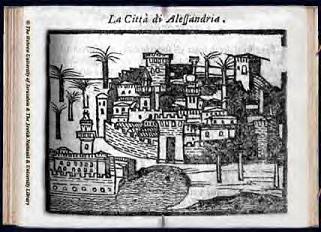
A view of Alexandria, from the 1484 Berlitz Guidebook
After crossing yet more desert sands, they arrived at the gates of Alexandria, but it was just before their arrival that Uthman received the terrible news:
Letter from Sultan Bayezid II of the great and glorious Ottoman Empire
Greetings to our dear ally Sultan Uthman of the somewhat small and insignificant Sultanate of Tunisia
Listen, I’m terribly sorry about this but we seem to be getting overrun by these pesky Mameluks that you declared war on. I note that they haven’t sent a single army against you yet, but I’m sure that’s about to change, since we’ve just made peace with them for a small sum. Good luck with the war!
Yours in inseparable loyalty and brotherhood
Bayezid
The Mameluk armies, fresh from crushing the might of the Ottoman Empire, were now heading for Alexandria, and more particularly, the Hafsid Army which was besieging it. What’s more, the Mameluks were now in no mood to hand over Cyrenaica in a peace deal. They were more in a “Let’s teach these snivelling Hafsids a lesson” sort of mood. But still Uthman had hopes of capturing Alexandria, to improve his bargaining position if nothing else.
1485 turned out to be something of a ‘bad hair year’ for Sultan Uthman. In January the Hafsid Army was driven out of Alexandria and his hopes of capturing the city dissolved. Then in February Algiers declared war. Fortunately the Fezzis came to Uthman’s aid, and at first it seemed that this new war on his western front might actually be a Good Thing. In May the Mameluks had reached El Alamein and were besieging it, while still of course rejecting Uthman’s now desperate peace offers.
He decided to cut his losses in the east and see if the Algerians could be taught a lesson. The small force in Aures invaded Atlas province, defeated an even smaller Algerian force, and besieged Biskra. Meanwhile, the peasants of the realm had decided that enough was enough and that it was time to revolt. In Tripoli a violent uprising was led by a young revolutionary leader, styling himself ‘Sultan Muammar’. Also, Uthman was having to take out more and more loans, just to keep his now very small army supplied.
In July 1486 El Alamein was recaptured by the Mameluks. The war with Algiers did not go well. The Tunisians failed to get a foothold in Atlas province, and although the Fezzis captured Oran, a large force of Mameluks had meanwhile landed further west and laid siege to Tangiers. In 1487 Uthman made peace with Algiers, paying a small sum in indemnities. Then the peasants of Kabylia joined the Stop the War movement and came out in open revolt and soon after, Tripoli fell to the so-called Sultan Muammar.

‘Sultan Muammar’ stirring up trouble in Tripoli
In 1488 Sultan Uthman finally died, after a reign of 53 years. He was succeeded by his son Sultan Zakariyya II, who inherited a situation of general chaos throughout the realm. This was not helped by his general lack of ability - “totally useless” was the phrase that sprang to people’s minds when they tried to sum up his qualities in a couple of words. Apart from his coming to power the main event of the year was that the rebels in Kabylia seized control of the province.
In 1489 a government official by the name of Abdul-Mu’min launched a successful coup d’etat and the population rejoiced to see the back of Sultan Zakariyya the Useless. However, Abdul-Mu’min stopped short of having him beheaded, an act of mercy which he later came to regret. Later in the year the Mameluks recaptured Benghazi, and the Berber rebels from Kabylia reached the gates of Tunis. Tripoli was recaptured from ‘Sultan Muammar’ soon after, but unfortunately Tunis fell to the Berbers soon after that, and Abdul-Mu’min finally managed to make peace with the Mameluks in November 1489, paying them a mere 38 ducats.
The Hafsid Army now gathered to besiege their own capital city of Tunis, and ‘Sultan Muammar’ took the opportunity to lead another revolt in Tripoli in September 1490. At this point the government of Tunisia, now in exile in Constantine, collapsed. ‘Sultan Muammar’ set up what he called the ‘Tripoli Council’ and declared Tripoli an independent nation, and in the ensuing anarchy Zakariyya the Useless somehow managed to seize power once more in Tunis. It was a sad day for the realm...
Sultan Zakariyya of the somewhat cash-strapped and extremely unstable Sultanate of Tunisia: Ah, good, the results of the latest opinion poll - tell me the good news!
Opinion poll researcher, ruffling through a large wad of papers: Good news, good news... hmmm, er - I don’t think there’s seems to be any of that Your Majesty...
Zakariyya: What! But the people - surely they are ecstatic that I am back in power?
Researcher: Umm - let me see... “Ecstatic”, here we are... er, not a very large percentage in that category I’m afraid, Sire.
Zakariyya: Double figures at least, surely?
Researcher: Well - er... zero, actually...
Zakariyya: Well, what about, “Quite pleased”?
Researcher: Er... let me see... “Quite pleased”, here it is - um, no, Your Majesty, that’s zero as well.
Zakariyya: ”Indifferent”?
Researcher: Zero again, I’m afraid, Sire.
Zakariyya: ”Somewhat unhappy”??
Researcher: Er..., no that seems to be zero too.
Zakariyya: But - that only leaves “Ready to revolt”, doesn’t it?
Researcher: Yes, Sire - you seem to have reached triple figures in that category... If I might offer Your Majesty my congratulations...
Zakariyya: Shut up, you idiot! Well, what a bunch of ungrateful, good-for-nothing... Wait - I’ll show them. I am going to win glory and honour for myself on the field of battle. We are going to war!
Thus Zakariyya’s first, and rather stupid, move was to declare war on the rebel state of Tripoli, which had the immediate effect that his allies, the Ottoman Turks, deserted him. It also provoked more revolts in Kabylia, Aures and Tunis, which the Hafsid Army had to try and quell before marching on Tripoli. In 1493 Kabylia again fell to the rebels and Tunisia finally went bankrupt. However, in September of that year the Hafsid Army managed to recapture Tripoli and ‘Sultan Muammar’ reluctantly accepted annexation back into the Sultanate of Tunisia.
This situation did not last long, however. The Sultanate, now suffering from a severe case of ‘Orange Sky Syndrome’, was racked by constant revolts, and in 1494 the government collapsed once again and ‘Sultan Muammar’ and the Tripoli Council once more declared independence. Zakariyya decided on a different approach this time, bringing the rebel state into his alliance with Fez. It was probably the first sensible thing he had done since coming to power.
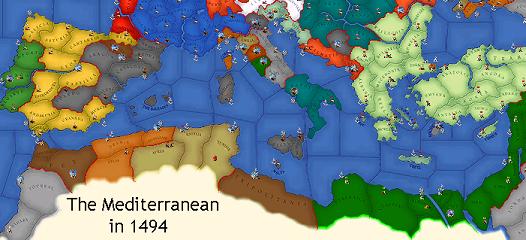
Maybe try a different career, juszuf7! Here's how it went:Ah yes, I see many dead Mameluks in the future!Let us see if my prophetic abilities are correct
Episode 5: How the East was Lost
Sultan Uthman was so excited, he could hardly wait. He had never owned so many ducats in his life, and he had a very powerful ally who, he felt sure, would easily be able to help him crush the nasty Mameluks. The only slight problem was that the Ottoman Empire was suffering from a strange meteorological phenomenon which caused the sky to be orange. Sultan Mehmet did not really want to start fighting the nasty Mameluks until the sky had turned blue again, so Uthman had to contain his excitement for several years till this had happened. Finally, in August 1481, the new Ottoman Sultan, Bayezid II, reported blue sky over Constantinople, and Uthman declared war.
This time he left a small force in Aures to discourage the Berbers from revolting, and the Algerians from invading. The rest of the Hafsid Army quickly marched across the desert sands to Benghazi once again and besieged it. The Mameluks seemed far more interested in fighting the Turks, much to Uthman’s relief, but it was not until September 1483 that Benghazi finally fell, and the Army marched on, over more desert sands, to El Alamein.
Meanwhile, the Turks were having great difficulty in containing the Mameluks, who were beginning to overrun their eastern provinces. This was definitely not part of the plan, and Sultan Uthman began to have a glimmer of doubt. In July 1484 El Alamein fell to the Tunisians. This would probably have been a good moment to make peace with the Mameluks, but Uthman’s greedy eyes were now on the city of Alexandria, the great centre of Eastern Mediterranean trade, and the Hafsid Army marched on.
A view of Alexandria, from the 1484 Berlitz Guidebook
After crossing yet more desert sands, they arrived at the gates of Alexandria, but it was just before their arrival that Uthman received the terrible news:
Letter from Sultan Bayezid II of the great and glorious Ottoman Empire
Greetings to our dear ally Sultan Uthman of the somewhat small and insignificant Sultanate of Tunisia
Listen, I’m terribly sorry about this but we seem to be getting overrun by these pesky Mameluks that you declared war on. I note that they haven’t sent a single army against you yet, but I’m sure that’s about to change, since we’ve just made peace with them for a small sum. Good luck with the war!
Yours in inseparable loyalty and brotherhood
Bayezid
The Mameluk armies, fresh from crushing the might of the Ottoman Empire, were now heading for Alexandria, and more particularly, the Hafsid Army which was besieging it. What’s more, the Mameluks were now in no mood to hand over Cyrenaica in a peace deal. They were more in a “Let’s teach these snivelling Hafsids a lesson” sort of mood. But still Uthman had hopes of capturing Alexandria, to improve his bargaining position if nothing else.
1485 turned out to be something of a ‘bad hair year’ for Sultan Uthman. In January the Hafsid Army was driven out of Alexandria and his hopes of capturing the city dissolved. Then in February Algiers declared war. Fortunately the Fezzis came to Uthman’s aid, and at first it seemed that this new war on his western front might actually be a Good Thing. In May the Mameluks had reached El Alamein and were besieging it, while still of course rejecting Uthman’s now desperate peace offers.
He decided to cut his losses in the east and see if the Algerians could be taught a lesson. The small force in Aures invaded Atlas province, defeated an even smaller Algerian force, and besieged Biskra. Meanwhile, the peasants of the realm had decided that enough was enough and that it was time to revolt. In Tripoli a violent uprising was led by a young revolutionary leader, styling himself ‘Sultan Muammar’. Also, Uthman was having to take out more and more loans, just to keep his now very small army supplied.
In July 1486 El Alamein was recaptured by the Mameluks. The war with Algiers did not go well. The Tunisians failed to get a foothold in Atlas province, and although the Fezzis captured Oran, a large force of Mameluks had meanwhile landed further west and laid siege to Tangiers. In 1487 Uthman made peace with Algiers, paying a small sum in indemnities. Then the peasants of Kabylia joined the Stop the War movement and came out in open revolt and soon after, Tripoli fell to the so-called Sultan Muammar.
‘Sultan Muammar’ stirring up trouble in Tripoli
In 1488 Sultan Uthman finally died, after a reign of 53 years. He was succeeded by his son Sultan Zakariyya II, who inherited a situation of general chaos throughout the realm. This was not helped by his general lack of ability - “totally useless” was the phrase that sprang to people’s minds when they tried to sum up his qualities in a couple of words. Apart from his coming to power the main event of the year was that the rebels in Kabylia seized control of the province.
In 1489 a government official by the name of Abdul-Mu’min launched a successful coup d’etat and the population rejoiced to see the back of Sultan Zakariyya the Useless. However, Abdul-Mu’min stopped short of having him beheaded, an act of mercy which he later came to regret. Later in the year the Mameluks recaptured Benghazi, and the Berber rebels from Kabylia reached the gates of Tunis. Tripoli was recaptured from ‘Sultan Muammar’ soon after, but unfortunately Tunis fell to the Berbers soon after that, and Abdul-Mu’min finally managed to make peace with the Mameluks in November 1489, paying them a mere 38 ducats.
The Hafsid Army now gathered to besiege their own capital city of Tunis, and ‘Sultan Muammar’ took the opportunity to lead another revolt in Tripoli in September 1490. At this point the government of Tunisia, now in exile in Constantine, collapsed. ‘Sultan Muammar’ set up what he called the ‘Tripoli Council’ and declared Tripoli an independent nation, and in the ensuing anarchy Zakariyya the Useless somehow managed to seize power once more in Tunis. It was a sad day for the realm...
Sultan Zakariyya of the somewhat cash-strapped and extremely unstable Sultanate of Tunisia: Ah, good, the results of the latest opinion poll - tell me the good news!
Opinion poll researcher, ruffling through a large wad of papers: Good news, good news... hmmm, er - I don’t think there’s seems to be any of that Your Majesty...
Zakariyya: What! But the people - surely they are ecstatic that I am back in power?
Researcher: Umm - let me see... “Ecstatic”, here we are... er, not a very large percentage in that category I’m afraid, Sire.
Zakariyya: Double figures at least, surely?
Researcher: Well - er... zero, actually...
Zakariyya: Well, what about, “Quite pleased”?
Researcher: Er... let me see... “Quite pleased”, here it is - um, no, Your Majesty, that’s zero as well.
Zakariyya: ”Indifferent”?
Researcher: Zero again, I’m afraid, Sire.
Zakariyya: ”Somewhat unhappy”??
Researcher: Er..., no that seems to be zero too.
Zakariyya: But - that only leaves “Ready to revolt”, doesn’t it?
Researcher: Yes, Sire - you seem to have reached triple figures in that category... If I might offer Your Majesty my congratulations...
Zakariyya: Shut up, you idiot! Well, what a bunch of ungrateful, good-for-nothing... Wait - I’ll show them. I am going to win glory and honour for myself on the field of battle. We are going to war!
Thus Zakariyya’s first, and rather stupid, move was to declare war on the rebel state of Tripoli, which had the immediate effect that his allies, the Ottoman Turks, deserted him. It also provoked more revolts in Kabylia, Aures and Tunis, which the Hafsid Army had to try and quell before marching on Tripoli. In 1493 Kabylia again fell to the rebels and Tunisia finally went bankrupt. However, in September of that year the Hafsid Army managed to recapture Tripoli and ‘Sultan Muammar’ reluctantly accepted annexation back into the Sultanate of Tunisia.
This situation did not last long, however. The Sultanate, now suffering from a severe case of ‘Orange Sky Syndrome’, was racked by constant revolts, and in 1494 the government collapsed once again and ‘Sultan Muammar’ and the Tripoli Council once more declared independence. Zakariyya decided on a different approach this time, bringing the rebel state into his alliance with Fez. It was probably the first sensible thing he had done since coming to power.
Last edited:
So the sultan bowed to the rebels and accepted them to be independent? Not wise from him. Yes, he isn't wise. That's explained. But the mamelukes will pay, won't them?
Not wise from him. Yes, he isn't wise. That's explained. But the mamelukes will pay, won't them?

Ouch! Eek! Eep! Yikes! Gadzooks! That was a setback, indeed. Perhaps you should be less greedy in the future. But I fully expect Carthage to rebound and learn from it's mistakes...
The ghost of Hannibal weeps with despair.
Ouch is right! Well, you did set yourself a challenging assignment.
I like your description of constant revolt risk as "orange sky syndrome." I'll have to remember that one.
Ouch is right! Well, you did set yourself a challenging assignment.
I like your description of constant revolt risk as "orange sky syndrome." I'll have to remember that one.
Oh - you are all too kind with your messages of sympathy and encouragement  . I'll be honest and admit that, if I hadn't been writing this AAR, I'd almost certainly have jacked the whole thing in at this point and started a new game as Aragon or something. Ditto if I'd posted my tale of woe and got nothing but stony silence. But how can I let you down and abandon the tale now???
. I'll be honest and admit that, if I hadn't been writing this AAR, I'd almost certainly have jacked the whole thing in at this point and started a new game as Aragon or something. Ditto if I'd posted my tale of woe and got nothing but stony silence. But how can I let you down and abandon the tale now??? 
And in any case, the news is somewhat better this time, though nothing astounding.
Episode 6: A Time for Giving
In 1494 Sultan Zakariyya Ibn Hafs the Useless finally died, and when the celebrations had died down it was discovered that his son Muhammad V was now Sultan, and that he seemed at first glance to be just as useless as his father. However, Sultan Muhammad V took a very different approach from Zakariyya. His ambition was to regain the province of Tripolitania from the mentally unstable rebel leader ‘Sultan Muammar’. However he guessed that Tunisia was in no condition to go to war successfully during his reign, and instead he spent virtually all of his tax income buying costly gifts which he sent to ‘Sultan Muammar’.
First, however, the nasty Mameluks declared war on Tripoli, evidently hoping to pick up the province by a quick annexation. Tunisa and Fez came to the aid of their new ally, while the Hedjaz gave support to the Mameluks. The Hafsid Army thus found themselves marching to Tripoli once more, but this time to defend ‘Sultan Muammar’s independence. After an initial defeat at the hands of a small Hedjaz contingent, the Tunisians regrouped, raised some reinforcements, and were back in Tripoli in time to inflict two defeats on the Hedjaz forces in October and November 1496. The Mameluks promptly made peace with Tripoli, paying the alliance a large sum in indemnities, which was certainly a welcome addition to Muhammad V’s treasury.
Sultan Muhammad immediately began sending gifts to ‘Sultan Muammar’. These gifts had varying effects. Some appeared to be immensely appreciated, while others left the flaky rebel completely indifferent.
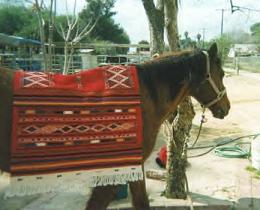
One of Muhammad V’s less successful gifts - an Arab thoroughbred with a handmade Tunisian carpet thrown in - ‘Sultan Muammar’ appeared to completely ignore it

This tasteful Minnie Mouse snowstorm souvenir was by far the most appreciated of all Muhammad’s gifts to ‘Sultan Muammar’ - the rebel leader came all the way to Tunis to personally thank him, and to grovel at his feet gibbering incoherently with pleasure
In 1508 all this costly gift-giving finally paid off, when an ecstatically happy ‘Sultan Muammar’ accepted to become Tunisia’s vassal. Sultan Muhammad, eager to see if the same strategy would work elsewhere, began plying the Sultan of Fez, Muhammad II, with similar gifts. But although Muhammad II became extremely friendly, for some reason he never showed the slightest interest in becoming a vassal.
Meanwhile ‘Sultan Muammar’s relations with Tunis remained volatile, and he had to be appeased every now and again with more gifts. This meant that the whole operation took much longer than expected, but finally, in 1525, after Muammar had just received a magnificent set of pink robes, he happily agreed that Tripoli would be much better off as a province of the Sultanate of Tunisia once more.
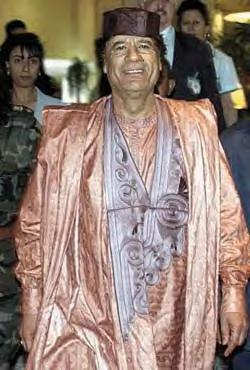
‘Sultan Muammar’ sporting the trendy outfit that clinched the deal
Having at last fulfilled his ambition, Sultan Muhammad felt it was only fair to die as soon as possible and leave the throne to his son Al-Hassan. This he did in 1526.
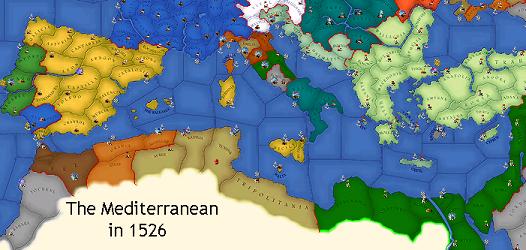
Well there we are - back where I was about 50 years ago! And my inflation is now at an impressive 95.8% . So this is where I need some helpful advice from some hardened campaigners - what on earth can I do now that will make the game interesting again? All suggestions welcome!
. So this is where I need some helpful advice from some hardened campaigners - what on earth can I do now that will make the game interesting again? All suggestions welcome!
And in any case, the news is somewhat better this time, though nothing astounding.
Episode 6: A Time for Giving
In 1494 Sultan Zakariyya Ibn Hafs the Useless finally died, and when the celebrations had died down it was discovered that his son Muhammad V was now Sultan, and that he seemed at first glance to be just as useless as his father. However, Sultan Muhammad V took a very different approach from Zakariyya. His ambition was to regain the province of Tripolitania from the mentally unstable rebel leader ‘Sultan Muammar’. However he guessed that Tunisia was in no condition to go to war successfully during his reign, and instead he spent virtually all of his tax income buying costly gifts which he sent to ‘Sultan Muammar’.
First, however, the nasty Mameluks declared war on Tripoli, evidently hoping to pick up the province by a quick annexation. Tunisa and Fez came to the aid of their new ally, while the Hedjaz gave support to the Mameluks. The Hafsid Army thus found themselves marching to Tripoli once more, but this time to defend ‘Sultan Muammar’s independence. After an initial defeat at the hands of a small Hedjaz contingent, the Tunisians regrouped, raised some reinforcements, and were back in Tripoli in time to inflict two defeats on the Hedjaz forces in October and November 1496. The Mameluks promptly made peace with Tripoli, paying the alliance a large sum in indemnities, which was certainly a welcome addition to Muhammad V’s treasury.
Sultan Muhammad immediately began sending gifts to ‘Sultan Muammar’. These gifts had varying effects. Some appeared to be immensely appreciated, while others left the flaky rebel completely indifferent.
One of Muhammad V’s less successful gifts - an Arab thoroughbred with a handmade Tunisian carpet thrown in - ‘Sultan Muammar’ appeared to completely ignore it
This tasteful Minnie Mouse snowstorm souvenir was by far the most appreciated of all Muhammad’s gifts to ‘Sultan Muammar’ - the rebel leader came all the way to Tunis to personally thank him, and to grovel at his feet gibbering incoherently with pleasure
In 1508 all this costly gift-giving finally paid off, when an ecstatically happy ‘Sultan Muammar’ accepted to become Tunisia’s vassal. Sultan Muhammad, eager to see if the same strategy would work elsewhere, began plying the Sultan of Fez, Muhammad II, with similar gifts. But although Muhammad II became extremely friendly, for some reason he never showed the slightest interest in becoming a vassal.
Meanwhile ‘Sultan Muammar’s relations with Tunis remained volatile, and he had to be appeased every now and again with more gifts. This meant that the whole operation took much longer than expected, but finally, in 1525, after Muammar had just received a magnificent set of pink robes, he happily agreed that Tripoli would be much better off as a province of the Sultanate of Tunisia once more.
‘Sultan Muammar’ sporting the trendy outfit that clinched the deal
Having at last fulfilled his ambition, Sultan Muhammad felt it was only fair to die as soon as possible and leave the throne to his son Al-Hassan. This he did in 1526.
Well there we are - back where I was about 50 years ago! And my inflation is now at an impressive 95.8%
Last edited:
I commend you for staying with the game even when things didn't go so well. Your gifts to butter up Khadafi were neat!
As for what to do next......
The best way I can think to bring down the inflation would be to play another country for a while and let the AI cheat the inflation down for you. I've never tried that, but that's all I can think of. Otherwise, you need not just an exceptional year, but an exceptional 20 or 30.
As for fighting the Mamelukes, normally it is not too difficult to get ahead of them in land tech and then smash them. But your inflation figure may make this approach not work so well.
I don't think I've ever seen Fez last in any GC before. Thanks for bringing in something new!
As for what to do next......
The best way I can think to bring down the inflation would be to play another country for a while and let the AI cheat the inflation down for you. I've never tried that, but that's all I can think of. Otherwise, you need not just an exceptional year, but an exceptional 20 or 30.
As for fighting the Mamelukes, normally it is not too difficult to get ahead of them in land tech and then smash them. But your inflation figure may make this approach not work so well.
I don't think I've ever seen Fez last in any GC before. Thanks for bringing in something new!
Expensive gifts... but you made nice use of them, of course! Finally "Sultan Muammar" areed to join Carthage!

But you'd better honour Hannibal some day...
But you'd better honour Hannibal some day...
Originally posted by Anibal
But you'd better honour Hannibal some day...
By trying to build elephant armies again?
Nice recovery. Your inflation is a bit of a problem, but not a killer.
Nice tale!!!!

Nice tale!!!!
That inflation might cause some trouble, but I'm sure you'll overcome it and expand the borders of the mighty nation of Tunisia.

